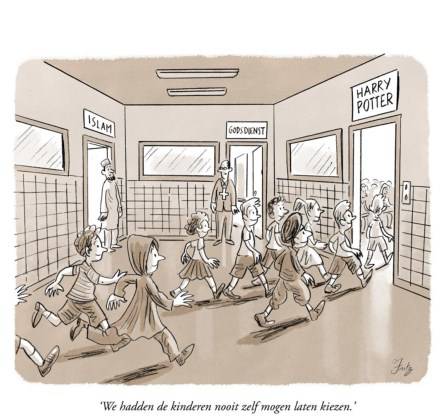While Lieven Boeve work would make 'dialogue' schools in Catholic education, with greater attention to diversity, Sofie Vanassche must establish that the pluralistic GO training institutions, the children are put aside for the life courses. But you do not learn about diversity especially by experiencing them?

Who? Teacher sociology of the family (KU Leuven).
What? When children their faith and share their values with each other, they are there fixed much wiser than when they are put aside to talk just about ideology.
On September 1, our eldest son came back proud of his first school in the first grade. We were naturally very curious about all the adventures of the day. After the usual "How was it?" - "Well," came after some persuasion the first stories. It was a shock when one of the most memorable observations apparently consisted of the innocent, childlike state that "all brown kids sitting master Muhammad.
Four years ago, we deliberately opted for a -school GO with a pluralistic vision. In kindergarten were children from different origins, are afflicted with different religions and different languages together at home, on the first morning song to jackets to go home. I certainly do not claim that there is no social cleavages can be observed in kindergarten, but in this school were not already reinforced by a structural division into separate compartments with private teachers. We were like parents also disappointed by the fact that our children are taught social cleavages through the organization of religious education in terms of culture, ethnicity and religion.
Not through books, ...
Is not it a shame to say that children, even in pluralistic GO !, from six years to be set apart for the philosophical subjects? Would not it be nice if kids can share their beliefs, values and attitudes with each other, aftoetsen together and confront? If we really want to create an open society in which diversity is an asset, then have children who know not only diversity through textbooks or other learning materials, but they have actually experienced diversity in interaction with others.
These "others" are indeed often much more alike than you might think at first glance, but you do not learn to sit in different classrooms. The fact that many adults currently fail to engage in intercultural dialogue is perhaps just due to the lack of attention for it within the education of previous generations. 'Culture' After all, has long been seen as something that was taught and imposed from above. New generations were incorporated into the existing culture by what sociologists call with big words' processes of enculturation and primary socialization. Newcomers were expected to take over the dominant culture (acculturation).
... But through discussions
In my vision, schools are no institutions for knowledge transfer or culture, but culture laboratories. Glades, where new generations can discuss about the cultural overervingen of previous generations and where they develop the culture of tomorrow itself. Places where there is room for social differentiation, not social fragmentation, inequality, standoff or social exclusion. We can best achieve this by dividing children into faith between master Muhammad, Miss Mary and Miss Els? Or by vegetarians and meat eaters, socialists and liberals, cyclists and motorists to separate from each other?
I am convinced that our children will experience a much richer philosophical development if they have to enter into dialogue with students of diverse backgrounds. Of course they have to do it alone. Children should it be accompanied by educational and teaching skilled attendants, like Mohammed, Mary and Els. Only those teachers should not do together, but in the same classroom. As a team of teachers with a different religion or belief pupils can get acquainted with the richness of cultural diversity without considering cultural disputes out of the way, then we think already on the right track.
Hopefully this can be a step in breaking the major segregation between schools in terms of home language, migration background, financial status, education level of parents, and yes even philosophical background. Paradoxically, today especially some 'white' and 'black' schools that want to transcend different philosophies through joint class projects, but lack the diversity to translate that vision into practice. Cultural diversity is an important prerequisite for becoming a dialogue school ', and on that front in Flanders is still much work to be done.
By Editorial Standard: Sofie Vanassche

Reactie plaatsen
Reacties